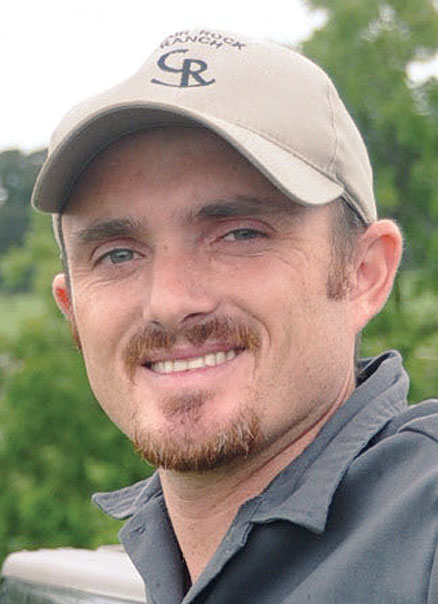
Only four years into Angus production, Reid Roberts of Sparta, Mo., knows what he wants and has a plan for getting there.
“Before I die I want someone to say ‘he raised exceptional beef. That’s what he did,’” Reid said. He has a couple of aces in his pocket. First, you could say that Reid married the farmer’s daughter. He and his wife, Kelli, lease hundreds of acres of prime ranch land from her grandfather, Floyd Whitworth, 90, who amassed Whitworth Ranch’s 4,700 acres – 7.7 square miles – during his trucking career. The family has been Angus proud for decades.
And, second, Reid is the general manager of and a partner in Metropolitan Farmer, a farm-to-table restaurant in Springfield, Mo., in the Farmer’s Park development only 30 feet from the weekly Farmer’s Market of the Ozarks and its locally grown produce and meat. Before that he managed Metropolitan Grill, which launched the new restaurant in late 2013.
Reid knows exactly what he’s looking for in a cut of beef served at the restaurant. And there’s no better beef than Angus, he contends.
“A pound of gold will always be worth more than a pound of silver,” he said. “There will always be a market for consumers who will pay extra for a superior product.
“I care about what ends up on the plate. Angus is the best breed for me to target for what I want to accomplish,” he added.
When Reid and Kelli moved to the ranch four years ago, he knew absolutely zero about anything country. But sometime early after the move, “the light bulb switched on.” He learned fast, discovered a passion for raising cattle and has proven pretty good at it. “I found that I not only enjoyed it but became very good at it,” he said.
Reid and Kelli own Paradise Valley Land & Cattle, and its herd of 74 cows and calves and one bull are one of four herds on the property. To date, the couple is the most hands-on of the owners, willing to forego old-school practices for new-age breeding, soil improvement and forage approaches.
For example, Reid has introduced rotational grazing, new watering systems and grass alternatives to fescue to the land. Instead of continuously grazing and haying acres, he moves his cattle around and this year has given a 40-acre hay pasture a rest. He’s attended a forage grazing school and works closely with the Natural Resources Conservation Service in Ozark to develop and implement long-term forage plans for different pasture plots totaling about 240 acres.
While admittedly in the infant stage of improving his land, Reid has done his homework. Last year he toured 10 farms, from ones that use 2, 4-D herbicide and heavy fertilizing to completely organic operations.
“Better soil means better forage means better animals. You can’t manufacture that with fertilizer. You can’t manufacture that philosophy,” he said, referring to the investment he’s making with environmentally smart – and economically viable – decisions. “I’m making believers out of the six guys out here on the ranch,” he laughed. “But you should have seen their faces.”
On the breeding side, Reid is all about genetics, carcass analysis, artificial insemination and this year embryo transplants. He credits cattlemen Tony Whitehead, Rick Hale and Ron Lock for mentoring him on raising cattle in the 21st century and staying ahead of the curve and with Ed Flatness (ranch manager) for “being the backbone of taking us where we want to go.”
He recently purchased three Angus cows from breeders in Georgia and Kansas to flush as possible donors. Their purchase was based using animals in the top tier for carcass data in the Angus breed. “That’s what I’m trying to obtain, whether in registered or commercial cattle. And I hope to have a large herd within a relatively short period of time,” he said.
“My goal is to grow as big as I can. To get there, I have to get really effective at this. Most breeders are way more effective than me. But I’m on fire and will get there.”
On the restaurant side, Reid said Metropolitan Farmer has brought a true Midwestern farm-to-table dining experience to Springfield, serving traditional dishes with a modern take. One responsibility he’s particularly good at is working with local farmers to develop a high-quality, reliable supply chain.
“The supply chain is extraordinarily tough,” he said. In a week, the restaurant goes through 60 whole chickens and 20 animals’ worth of tenderloins. While he supplies some beef, the demand is greater than his personal supply. So Reid builds relationships with pork, beef, chicken and fish producers. He taps into local breweries and distilleries and buys wine from the Post wineries in Arkansas and other wineries throughout the country. Locally grown produce can be a challenge, especially when growers price it too high.
“The farms and distributors we buy from have to be economically sustainable for them and affordable for us,” he pointed out.
Reid’s advice to area farmers and ranchers about stewardship, sound environmental practices and farm-to-table supply chains is “It’s all coming (to the Midwest) so you might as well get on the bandwagon and support those who try to support you. And as far as breeding is concerned, remember a pound of gold is always worth more than a pound of silver,” he said.







